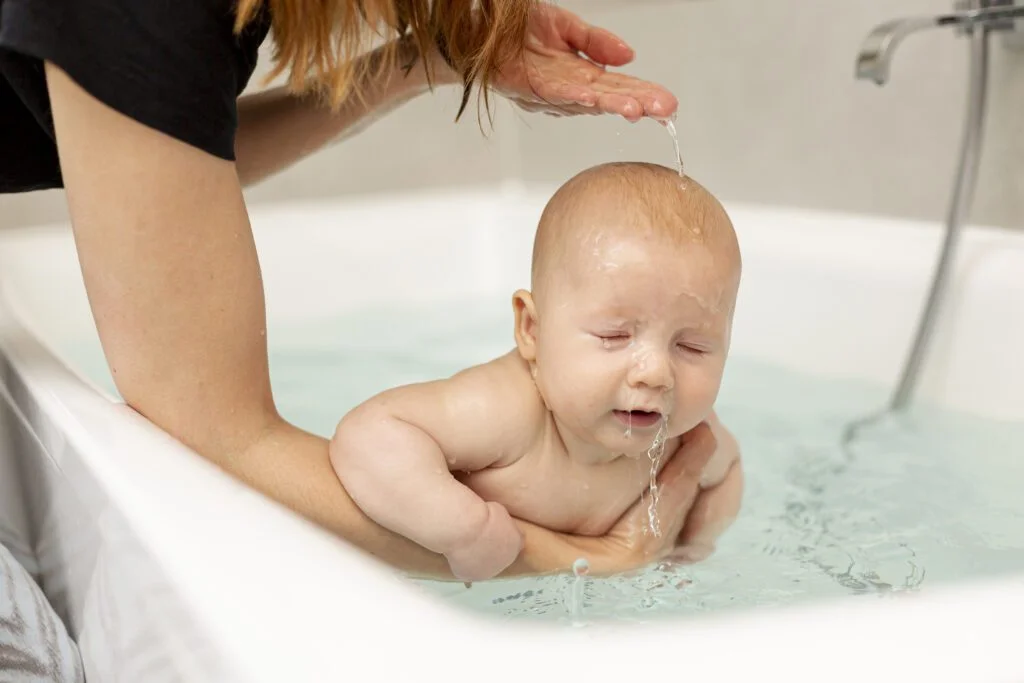Introduction
Becoming a parent for the first time is an exciting and transformative experience. It’s a journey filled with joy, challenges, and a lot of learning. This guide is designed to help first-time parents navigate the initial stages of parenthood with confidence and ease. From understanding baby care essentials to managing your own well-being, we’ve got you covered.

Preparing for Your Baby’s Arrival
Set Up the Nursery: Creating a safe and comfortable nursery is crucial. Ensure the crib meets safety standards, and avoid using pillows, blankets, or stuffed animals that could pose a suffocation risk. Invest in a good-quality baby monitor and consider blackout curtains to help your baby sleep better.
Stock Up on Essentials: Before your baby arrives, make sure you have all the necessary supplies:
- Diapers and wipes: Newborns go through about 10 diapers a day.
- Clothing: Include onesies, sleepers, and mittens to prevent scratching.
- Feeding supplies: Whether you plan to breastfeed or bottle-feed, have a supply of bottles, formula (if needed), and burp cloths.
- First aid kit: Include a digital thermometer, infant pain reliever, and other basics.
Educate Yourself: Knowledge is empowering. Consider taking prenatal classes to learn about childbirth, breastfeeding, and newborn care. Websites like BabyCenter and What to Expect offer valuable resources and communities for new parents.
Caring for Your Newborn
Feeding Your Baby:
- Breastfeeding: Aim to feed your baby on demand, approximately every 2-3 hours. Ensure a good latch to prevent soreness.
- Bottle-feeding: Follow the formula instructions carefully and feed your baby on demand.
- Burping: Always burp your baby after feeding to help prevent gas and discomfort.
Sleeping Patterns: Newborns sleep a lot but in short bursts. Follow the ABCs of safe sleep: Alone, on their Back, in a Crib. A consistent bedtime routine can help your baby distinguish between day and night.
Diapering and Bathing:
- Diapering: Change diapers frequently to avoid diaper rash. Use a barrier cream if needed.
- Bathing: Give sponge baths until the umbilical cord stump falls off. Use gentle baby soap and ensure the water temperature is lukewarm.
The best 6 baby bathtubs in 2024
Towels: Soft, absorbent towels are essential for drying your baby after the bath.
Thermometer: Use a baby bath thermometer to ensure the water temperature is safe.
Managing Your Own Well-Being
Rest and Recovery: Postpartum recovery is crucial. Get as much rest as possible and accept help from family and friends. Don’t hesitate to reach out to your healthcare provider if you’re struggling physically or emotionally.
Nutrition and Hydration: Maintaining a balanced diet and staying hydrated is crucial, particularly if you’re breastfeeding. Prioritize a diverse intake of fruits, vegetables, lean proteins, and whole grains.
Exercise: Once you get the green light from your doctor, incorporate gentle exercises into your routine. Walking, yoga, and postpartum fitness classes can help you regain strength and energy.
Building a Support System
Connect with Other Parents: Join parenting groups in your community or online. Websites like The Bump and Motherly offer forums and articles that can provide support and advice.
Seek Professional Help When Needed: Don’t hesitate to seek help from lactation consultants, pediatricians, and postpartum therapists. Early intervention can prevent small issues from becoming bigger problems.

Handling Common Newborn Issues
Colic and Gas: If your baby is fussy and crying for no apparent reason, they might have colic. Try soothing techniques like swaddling, rocking, or a warm bath. Burping your baby frequently and using anti-gas drops can also help.
Diaper Rash: To prevent diaper rash, change diapers often and keep the diaper area clean and dry. Use a diaper cream with zinc oxide to treat and prevent rashes.
Jaundice: Jaundice is common in newborns and typically resolves on its own. Ensure your baby is feeding well, as frequent feedings can help flush out the bilirubin. Consult your pediatrician if you have concerns.
Maintaining a Healthy Relationship
Communicate Openly: Parenthood can be stressful, and it’s important to communicate openly with your partner. Share your feelings and concerns and work together to find solutions.
Schedule Couple Time: Make time for each other, even if it’s just a few minutes a day. Regular date nights or simple activities like watching a movie together can help maintain your bond.
Share Responsibilities: Divide baby care tasks to avoid burnout. Dividing responsibilities not only eases the burden but also reinforces your partnership.
Conclusion
The journey of parenthood is an unparalleled and fulfilling experience. While it comes with its challenges, being prepared and having a support system can make the transition smoother. Remember, it’s perfectly fine to seek help and take time for yourself Enjoy every moment with your little one, as they grow up faster than you can imagine.
For more detailed information, check out resources like HealthyChildren.org and Parents.com. Happy parenting!




Thank you for your sharing. I am worried that I lack creative ideas. It is your article that makes me full of hope. Thank you. But, I have a question, can you help me? https://www.binance.com/ro/register?ref=V3MG69RO
I don’t think the title of your article matches the content lol. Just kidding, mainly because I had some doubts after reading the article.
Your article helped me a lot, is there any more related content? Thanks!